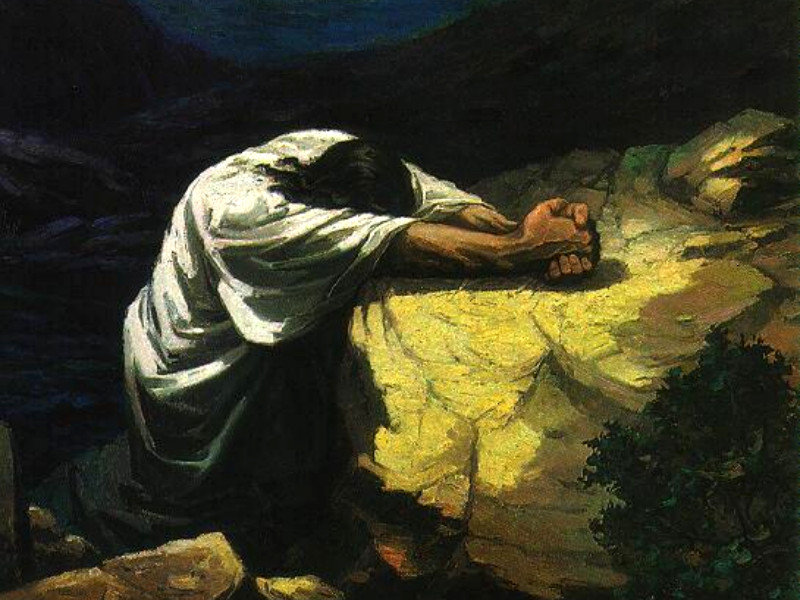“Simon…Satan demanded to have you, that he might sift you like wheat…”
It is fortunate–oh, so fortunate–that it was not Job, that paragon of patience and faith, that Jesus claimed he would build his church on.
And that’s not the non-sequitur it first appears to be, because Job and Peter actually have quite a lot in common.
“Simon, Simon, behold, Satan demanded to have you, that he might sift you like wheat, but I have prayed for you that your faith may not fail. And when you have turned again, strengthen your brothers.”
Some context in Peter’s life: For weeks now, even months, Jesus has prophesied that he will find his doom in Jerusalem. Now, on the heels of the strangest Passover dinner ever, Jesus sets his affairs in order, giving his disciples what is clearly meant to be his last few words with them. And in the middle of it, sensing Peter’s denial and fear, he drops this bombshell: Satan has personally petitioned the Father for particular access to the persons of Simon and the rest of the disciples (the first “you” is plural). Jesus then singles out Simon again by addressing him with the singular “you”, saying he will pray for Simon in particular, and that Simon in particular will turn away regardless.
Satan’s purpose in gaining access to the disciples is to “sift them like wheat.” This is a much more graphic and threatening image than first appears, because to sift wheat, you first beat it to separate it into its component parts, then you toss the resulting mess into the air (likely with a winnowing fork) to separate the wheat from the chaff. The wheat is stored and treasured, and the chaff? Thrown into the fire to be burned.
Satan has asked for explicit permission to sift the disciples: to beat them into pieces, to reduce them to their very essence, and toss them into the air to see what among them was wheat and what among them was chaff, fit only to be blown away by the wind and burned. It is unfortunate that Peter was too busy denying Jesus’ prediction of failure to give any thought to what preceded it. If he had considered Jesus’ initial remark, it is probable that he would have had one thought in his mind: “Son of a donkey, I’m being Job’ed...”
And indeed, the situation Jesus hastily sketches out in the Upper Room of Jerusalem bears an eerie similarity to the situation fleshed out in one of the oldest of OT scriptures. Satan takes a personal interest in a particular servant of God, and he makes it his mission to utterly destroy that servant. He personally petitions God for the authority to do so. And, having obtained permission to test the servant of the Most High, Satan goes to town on him.
Why Peter? For the same reason Satan chose Job: both had been singled out as God’s servants. God implicitly challenged Satan, boasting of Job’s uprightness and righteous fear of the Lord, highlighting Satan’s failure to dent said righteousness. And Satan can’t have been ignorant of Christ’s proclamation concerning Peter, especially considering that Jesus again made it personal by specifying that the Church built on Peter would tear down the very Gates of Hell.
Of course, it doesn’t seem as though any of this entered Peter’s mind. He was too frightened and confused, and too obsessed with looking like he wasn’t frightened and confused, for him to really consider Jesus’ words. There is at this point only the immediate gut reaction, the ill-considered boast that Peter would die before turning away from Christ. With Peter, we see highlighted in lurid color the frail humanity of the tools God chooses to use. The steadfastness of Job is legendary, just this side of super-human: Peter snaps like a twig. The tension of the last several weeks, and the last several days in particular, comes to head in a night that begins with an upsetting of the ceremony that, for all intents and purposes, founded the Jewish people, and ends in Roman soldiers and temple police arresting the man Peter had devoted his life to. He breaks, and he breaks hard. He is sifted, and (for the moment, at least) he is found to be mostly chaff.
And this is the rock that Christ builds his church on? This quivering mess of a man, who cannot stay awake while watching over his master, who speaks before thinking, who denies so much as knowing the man who had brought him out of darkness… this man, in fact, who breaks in exactly the same way as Christians throughout the world do on any day of the week?
Yes.
And that is why it is fortunate that Jesus’ Church is built on Peter, and not on Job. We may remember Job during our greatest trials, but it is Peter who we unwittingly emulate in our day-to-day lives. It is Peter’s faithlessness that causes us to sink, and Peter’s cowardice and foolishness that brings us to shame… and it is Peter’s genuine love and passion for Jesus that brings us to our feet again.
You can read more from this author at his home blog, “Imperfect Reflections,” or see his work “Simon, Who is Called Peter” published by Wipf and Stock Publishers and available at Amazon.com
Photo credit John Pavelka, Flickr



